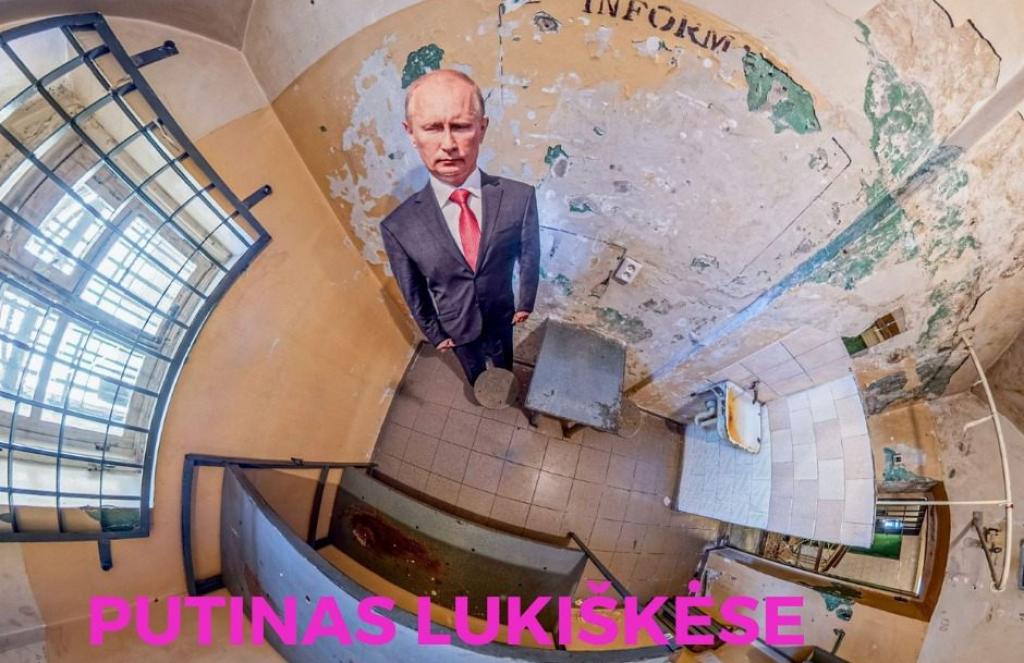Thessaloniki gets ready for its metro launch in November
The underground rapid transit lines have been under construction for almost two decades due to various project delays
 TheMayor.EU logo
TheMayor.EU logo 
The virtual tour of Lukiškės Prison contains one virtual prisoner - Russian President Vladimir Putin, Source: Vilnius Municipality
Google Street View and the city’s tourism authorities have teamed up to create a digital rendition of justice served to the Russian president
Lukiškės Prison in the city of Vilnius is no longer a place of punishment and is now a centre for cultural innovation. That has given creative minds the possibility to come up with new ideas to bring attention to its unique early-20th century architectural design. The latest such is a collaboration between Go Vilnius and Google Maps, which gives you the chance to explore the prison virtually.
During the tour, you will encounter an interesting sight – a full-size image of Russian President Vladimir Putin staring sadly through the bars of a prison cell. This ‘easter egg’ ties in well with previous actions from Vilnius that have fused art and politics as means to protest the Russian invasion of Ukraine.
Elijas Šležas, a virtual photography artist helped with the cardboard cutout of the Russian President to create the whole set and send a message, which, in true Vilnius style, can be considered pioneering in the field of political art.
The prison, however, is itself something of a penitentiary architectural curiosity, given that it was designed to follow the ideas of British social theorist Jeremy Bentham. The latter gave the idea of a prison design, called Panopticon, where one guard could easily observe all inmates without them knowing if they were being watched or not. That alone, the theory states, would cause them to self-moderate their behaviour.
Virtual tourists can also look at the prison’s yards and St. Nicholas Orthodox Church, thanks to the Google Street View technology now adapted to the exploration of closed spaces.
Lukiškės Prison was built in 1905. Throughout a century of its operation, it was used for convicts and political prisoners opposed by various political authorities, including Tsarist Russian, Nazi German, and the Soviets. The prison survived both World Wars and held many political prisoners from Lithuanian, Belarussian, Polish, Jewish, and other backgrounds.
Vilnius and Lithuania are increasingly in the crosshairs of political debate and Kremlin’s displeasure. Whether it is by deciding to rename streets to honour Ukrainian heroes or by banning the transit of Russian energy commodities through its territory (the small country lies between Belarus and the Russian enclave of Kaliningrad), it’s never quiet on the geopolitical front there.

The underground rapid transit lines have been under construction for almost two decades due to various project delays

Now you can get your wine in Talence by paying directly in Bitcoin

That’s because the state has to spend money on updating the railway infrastructure rather than subsidizing the cost of the popular pass

Rethinking renewable energy sources for the urban landscape

The examples, compiled by Beyond Fossil Fuels, can inform and inspire communities and entrepreneurs that still feel trepidation at the prospect of energy transition

Now you can get your wine in Talence by paying directly in Bitcoin

The 10th European Conference on Sustainable Cities and Towns (ESCT) sets the stage for stronger cooperation between the EU, national and local level to fast track Europe's transition to climate neutrality.

At least, that’s the promise made by the mayor of Paris, Anne Hidalgo

The underground rapid transit lines have been under construction for almost two decades due to various project delays

At least, that’s the promise made by the mayor of Paris, Anne Hidalgo

Hostal de Pinós is located in the geographical centre of the autonomous region

Despite its church-y name, the district has long been known as the hangout spot for the artsy crowds

Urban dwellers across the EU are having a say in making their surroundings friendlier to people and the environment.

Forests in the EU can help green the European construction industry and bolster a continent-wide push for architectural improvements.

Apply by 10 November and do your part for the transformation of European public spaces

An interview with the Mayor of a Polish city that seeks to reinvent itself

An interview with the newly elected ICLEI President and Mayor of Malmö

A conversation with the Mayor of Lisbon about the spirit and dimensions of innovation present in the Portuguese capital














